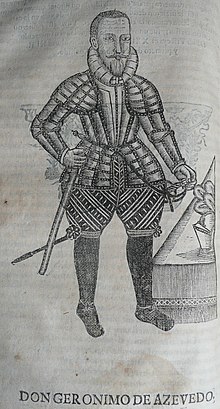Jerónimo de Azevedo
| Jerónimo de Azevedo | |
|---|---|

Jerónimo de Azevedo in Ásia Portuguesa of Manuel de Faria e Sousa
|
|
| Viceroy of Portuguese India | |
|
In office 1612–1617 |
|
| Preceded by | Rui Lourenço de Távora |
| Succeeded by | João Coutinho |
| 2nd Governor of Portuguese Ceylon | |
|
In office 1594–1613 |
|
| Monarch |
Philip I of Portugal Philip II of Portugal |
| Preceded by | Pedro Lopes de Sousa |
| Succeeded by | Francisco de Meneses |
| Personal details | |
| Born | 1540 Kingdom of Portugal |
| Died | 1625 (aged 85) Lisbon, Kingdom of Portugal |
| Nationality | Portuguese |
Jerónimo de Azevedo (1540 – Lisbon, 1625) was a Portuguese fidalgo, Governor of Portuguese Ceylon and Viceroy of Portuguese India. His full name was Jerónimo de Azevedo de Ataíde Malafaia and he was the 8th son of Dom Manuel de Azevedo, Comendador of São João de Alpendurada and brother of Blessed Inácio de Azevedo.
Dom Jerónimo de Azevedo was a key figure in the late 16th-century Portuguese takeover in Ceylon (present day Sri Lanka).
Azevedo was nominated 20th viceroy of India in 1611, and left Colombo for Goa in 1612. In 1615 he backed an audacious expedition to Pegu to loot the Moon imperial treasures in Mrauk-U, an enterprise that ultimately did not succeed. However, the fact that it was supported at such a high official level showed how plunder was considered a legitimate policy objective in 16th-century Portuguese-ruled Asia. Also in 1615 Azevedo led a huge fleet that tried to drive English East India Company ships under the command of Nicholas Downton off Surat, but after a series of engagements he ultimately failed – an incident which demonstrated that Portuguese Goa had lost the capacity to protect its monopoly of trade on the west coast of India.
A. R. Disney further states that by the time of Dom Jerónimo de Azevedo's mandate as viceroy the influence of colonials in Goa, as distinct from metropolitan Portuguese, was steadily growing. These colonials had interests and an outlook that did not necessarily coincide with those of the metropolis. In practice, Dom Jerónimo de Azevedo – who had come to Asia as a young man and served for his entire career in the Portuguese "Estado da Índia" – was a colonial. This influence of colonials coincided with a period of resurgent Portuguese expansionism in South and Southeast Asia, that reached its peak when Azevedo took office in 1612 but was already a spent force when he terminated his mandate as viceroy in 1617.
...
Wikipedia
